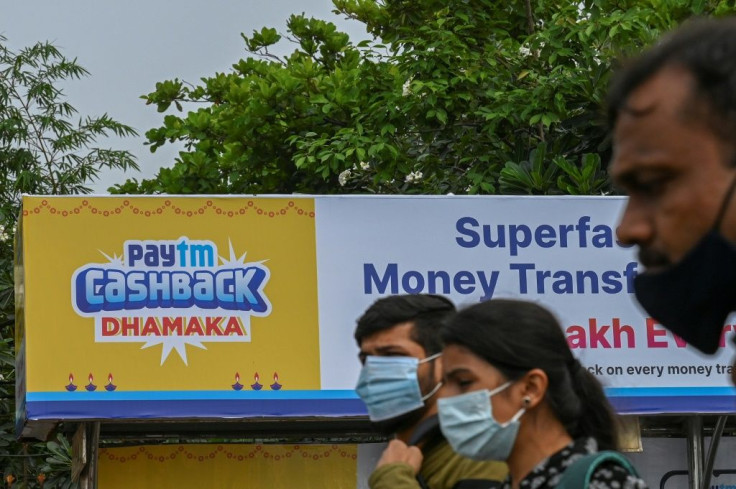Indian Tech Startups Head For The Markets In 2024, After Dodging Funding Winter

KEY POINTS
- 12 major IPOs are set to hit the market in 2024
- Unicorns Flipkart, Paytm and Zomato attracted major funding rounds
- India has over 70,000 active tech startups across sectors
Indian digital tech startups are making a comeback to the stock markets, driven by online consumption as more people flock to the digital landscape, and companies cut costs by deploying technology.
That is despite a volatile 2023, when headwinds roiled the Indian stock market, including the Hindenburg-Adani report that wiped billions off the market capitalization one of the country's biggest business groups. India's Supreme Court on Wednesday rejected a plea to transfer a probe by the mark regulator Securities and Exchanges Board of India to a special investigation team, effectively containing the storm unleashed on the markets by the shortseller's report.
The markets witnessed some momentum in the second half of 2023, which is expected to carry into 2024.
Ola Electric, the electric vehicle subsidiary of ride-hailing startup Ola; omnichannel retailer FistCry; and Aakash, a subsidiary of edtech unicorn Byju's, are among the 12 major IPOs set to hit the Indian market this year.
For Byju's, especially, this could be a big change in fortunes. Founder Byju Raveendran had to pledge his home to pay wages to staffers as the company stared at a cash crunch.
So what has happened to provide a boost for India's startup ecosystem?
"We need not just look at startup funding, FDI inflows will spur the boom, especially for the manufacturing sector, thanks to China Plus One," Dharmesh Mehta, the CEO of broking firm DAM Capital told International Business Times. China Plus One, or C + 1 is corporations' business strategy to avoid investing only in China, amid Beijing's tensions with Washington, and to diversify business into other countries.
"Tech-enabled platforms like business payment companies, delivery platforms, transportation companies, etc., are going to benefit due to fundamental changes in consumer behavior," he added.
Mehta said that with the ruling Narendra Modi-led government facing reelection this year, Indian businesses would like to see political stability. They would rather wait for the final results of the general elections, expected to be held around May, before funneling in money. "But they are upbeat and the investment plans are ready," he said.
Investments in Indian tech startups reached $38.5 billion in 2021, with unicorns like Flipkart, Paytm and Zomato attracting major funding rounds. As of 2021, India boasts over 70,000 active tech startups across various sectors.
E-commerce continues to dominate investments, with a market size of $100 billion. It is estimated to attract investments ranging up to $350 billion by 2025. The average order value is around $25, with mobile penetration driving online shopping adoption.
The financial technology sector is also seeing a boost, driven by increased digital payments adoption. In 2021, the value of digital transactions in India was $1.3 trillion. Paytm, a lead player in the space, alone processes over two billion transactions monthly.
Vibrant ecosystem
India's startup ecosystem is a vibrant and exciting space, bursting with potential and brimming with success stories.
Sectoral stories
- E-commerce: Giants like Flipkart, Nykaa and Myntra have transformed the way Indians shop, offering convenience and variety like never before.
- Mobile Technology: Ola and Zomato have revolutionized transportation and food delivery, while Paytm has redefined digital payments, making everyday life easier.
- Edtech: Byju's and others are leading the charge in online education, making quality learning accessible to millions across the country.
- Healthcare: PharmEasy and other startups are making healthcare more accessible and affordable, bringing much-needed innovation to the sector.
Not just Unicorns
The ecosystem isn't just about billion-dollar giants. Countless smaller startups are tackling diverse challenges in fields like agriculture, clean-tech and social impact, driving positive change across the country.
What boosts India
- Tech-savvy population– A young, tech-savvy population provides a fertile ground for innovative ideas to take root.
- Government's patronage– Initiatives like Startup India and Digital India provide crucial backing to startups, offering funding, mentorship and regulatory ease.
- Investment avenues: Venture capitalists and angel investors are increasingly recognizing the potential of Indian startups, pouring in funds that fuel their growth.
Many opportunities, and many challenges
Despite the successes, challenges remain. Access to talent, infrastructure and funding are hurdles for startups. However, these challenges also present opportunities for innovative solutions and further growth. A supportive ecosystem, a deeply talented workforce and a vast market drive India's startup ecosystem.
India's economy ended the year 2023 with a GDP of $3.73 trillion, which is expected to hit $5 trillion by 2027.
As per industry estimates, tech startups have created more than 3 million jobs in the Indian startup ecosystem. Back-of-the-envelope calculations hint that tech startups will account for 10% of the country's GDP by 2030.
© Copyright IBTimes 2024. All rights reserved.



















